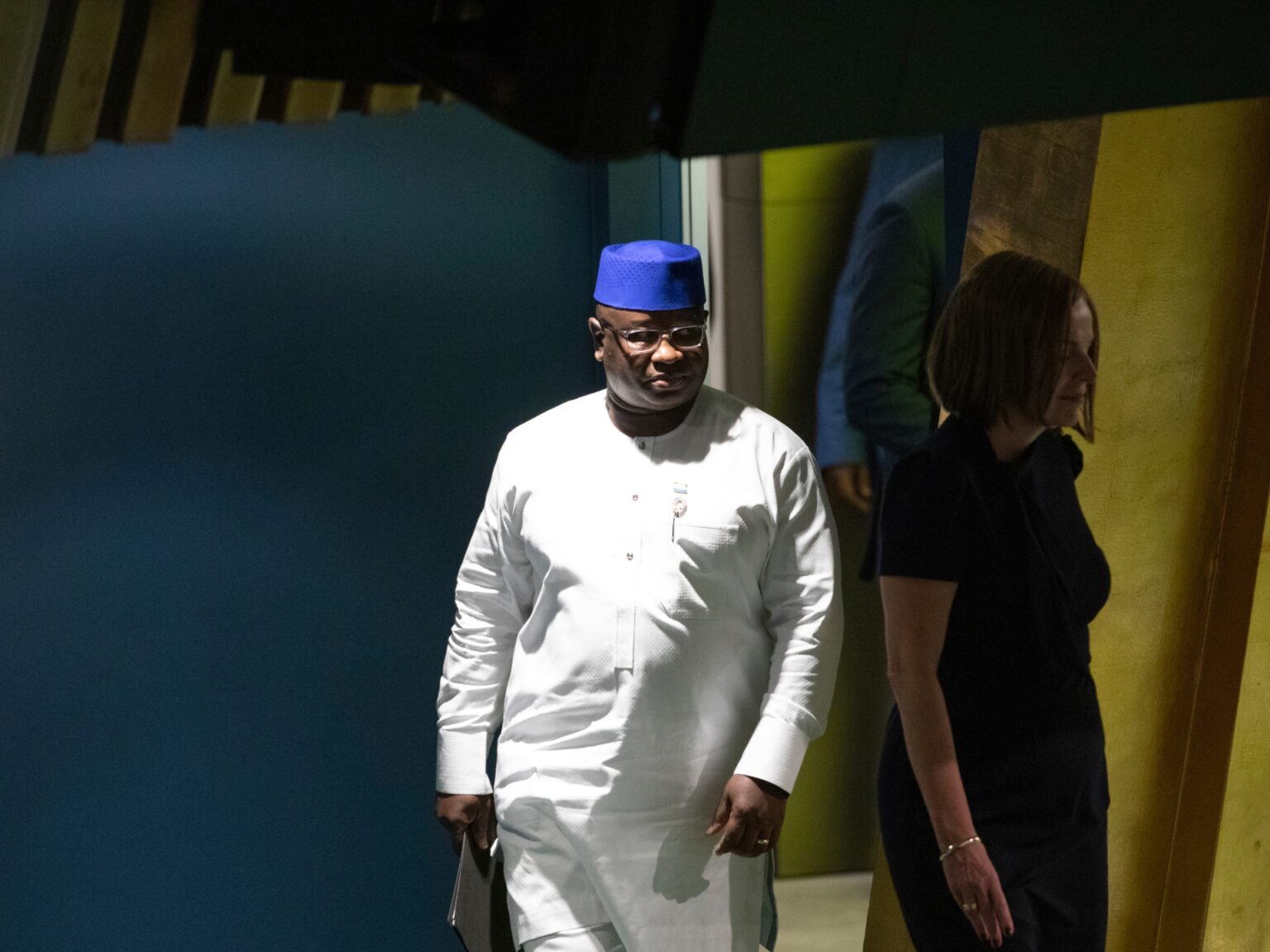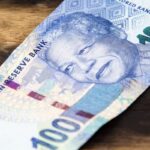Global Courant
Freetown, Sierra Leone – On April 23, President Julius Maada Bio and Kandeh Yumkella danced together at a public event in Freetown, the capital of Sierra Leone, effectively heralding the start of the 2023 election season in the West African state.
The occasion marked the signing of a strategic alliance between the ruling Sierra Leone People’s Party (SLPP) and Yumkella’s National Grand Coalition (NGC), one of the country’s opposition parties, ahead of June 24 presidential elections.
Today, @PresidentBio And @KYumkella danced, smiled and spoke from their hearts about forging a progressive Alliance. The auditorium was both exciting and promising with shared hopes to build a progressive country. #Lighting up pic.twitter.com/s51ZNjgYpM
— Yusuf Keketoma Sandi Esq. (@Keketoma_Sandi) April 23, 2023
Political allegiances are in flux ahead of the vote, with prominent politicians aligning themselves with former enemies to boost their election chances.
Five years ago, both men were on opposite sides, seeking the same position.
SLPP’s Bio won that presidential election, ahead of 43.3 percent to 42.7 percent by Samura Kamara of the then-ruling All People’s Congress (APC) in the first round of voting. NGC leader Yumkella was third.
Bio narrowly won in the second round against Kamara, then backed by outgoing President Ernest Bai Koroma, who was ineligible after two terms in office.
A rematch with a difference
Officially, the election campaign started on May 23, but the outcome of the June 24 poll will be determined by a lot of potential drama in the month leading up to the vote.
About 3.3 million people — about half the total population — are registered to vote in what is shaping up to be a hotly contested election.
Bio will once again face the APC’s Kamara, hoping to win the 55 percent needed in the first round for a second and final term in office.
Four years ago, the NGC and fellow opposition party Coalition for Change (C4C) won a combined 10.4 percent of the vote in the first round. Neither party is fielding candidates this year.
While the NGC has agreed to an alliance with the SLPP to present Bio as the sole candidate, C4C leader Sam Sumana, who served as the country’s vice president from 2007 to 2015, also left to rejoin the APC. close, causing the smaller party to break up.
“This election confirms the continued dominance of Sierra Leone’s two main political parties (SLPP and APC) and an entrenchment of ethno-regional political allegiances,” said Andrew Keili, a political analyst who ran alongside Yumkella at the NGC in 2018. ticket, to Al Jazeera. .
There are also changes to the electoral system.
The electoral reform, proposed by Bio and implemented by the Electoral Commission for Sierra Leone (ECSL) in the second half of 2022, was politically controversial, but was ruled legal by the Supreme Court in January 2023 after the APC challenged the decision.
A system of proportional representation of districts, last used in 2002, will replace the first-past-the-post system for parliamentary and municipal elections.
Under the new system, political parties create lists of candidates at the district level, with seats awarded based on the percentage of the vote the party receives in a district.
The new threshold required to win a seat in a district is set at 11.9 percent of the vote and favors the two dominant parties. Smaller parties such as the C4C and NGC – which together have 12 seats in the current legislature – are likely to be pushed out of parliament.
initial, feared the opposition that the seats would be allocated using figures from the disputed 2021 census, which saw significant increases in SLPP strongholds and corresponding decreases in APC-supported areas.
However, the ECSL agreed to use an average of the last two census figures – both politically disputed – to apportion the seats.
The opposition has also expressed concerns about the voter registration process, the subsequent clean-up of the register and the independence of key election institutions.
In December 2022, APC Interim Secretary Abdul Kargbo expressed concern that both voter registration and verification were “deliberately designed and used to create an uneven playing field to disenfranchise a certain portion of the electorate at the expense of our party “.
although a March 2023 survey suggested by the Institute for Governance Reform that nearly three-quarters of Sierra Leonean residents view ECSL as credible, there is a lingering perception among many APC supporters that the election is being staged to deliver a result in which Bio is the victor.
Identity trumps problems
In Sierra Leone, politics, ethnicity and region have traditionally been more attractive to the electorate than political ideologies; the southern and eastern regions are strongholds of the SLPP, while the northern and western regions are more likely to support the APC.
Bio won an average of 87 percent of the vote in the seven southern and eastern districts in the 2018 presidential election, while Kamara won 78 percent in the north and west, excluding Freetown.
Bio’s success then was due in part to tripling its vote share in the North — from 6 percent during its failed run in 2012 to 18 percent in 2018.
As the voting pattern looks likely to remain the same in 2023, this time around it has become even more important for both candidates to make marginal gains in opponents’ strongholds.
In recognition of this ethno-regional dynamic and the need to strengthen voter support and expand into new areas, Bio has been undertaking “country tours” since the start of the year, visiting nearly every chief in the country .
These visits, often strategically timed to coincide with the launch of new projects or the disbursement of funds such as community shares of mining revenue, are a reminder of what the president can deliver, analysts say.
“Bio has a big lead and the opposition will struggle to catch up,” Keili told Al Jazeera.
Meanwhile, a lawsuit against its flag bearer has left the APC behind in the ruling party’s preparations. Kamara, accused of misallocating public funds allocated to a New York consulate renovation project when he was Secretary of State (2012-2017), was first charged in December 2021.
The case will then be heard on July 14.
Government critics suggest the icy pace of the case through the courts is a tactical design to frustrate Kamara’s candidacy. With his attention divided, his ability to fund and run an effective campaign has been hampered.
Economic difficulties
The opposition figure is keen to take the spotlight away from him and onto things like the economy.
In 2018, the SLPP came to power, pledging, among other things, to solve “excruciating poverty and … a youth quake of unskilled, underpaid and unemployed youths roaming the streets”.
But mass unemployment, high levels of inflation and a depreciating currency continue to leave many Sierra Leoneans in marked economic difficulties. In August 2022, there were protests in Freetown and several northern cities over the rising cost of living, resulting in more than 20 deaths when security officers fired on demonstrators.
This time, President Bio has promised a youth employment program with the goal of creating 500,000 jobs in five years.
For his part, Kamara – who has also pledged to “intensify job creation efforts” – has pledged to “work to transform Sierra Leone from a consumer to a competitive manufacturing economy.”
But according to Keili, talking about economics “can help the APC in urban areas (but) in rural areas, ethnic identity will be the deciding factor.”
“The economy may be bad, but people may think it will be even worse without their ethnic group at the top,” he told Al Jazeera.
Indeed, such sentiments were echoed by 55 percent of respondents to a 2020 Afrobarometer survey (pdf) from the eastern and southern regions of Sierra Leone – where Bio comes from. Most respondents there believed that the country was moving in the right direction. But only 15 percent in the opposition-dominated northern and western regions agreed.
Analysts say a repeat of the scale of last August’s protests during the election is unlikely.
But potential clashes between supporters of political parties or with the security services could further exacerbate tensions in the country as divisive political rhetoric continues to mount.
In hotly contested elections, there is a risk of further entrenching and hardening of such divisions, with implications for democratic development in the country.
“Sierra Leone has made commendable progress in building democratic institutions and maintaining stability since 2002,” Isata Mahoi, national network coordinator at the West Africa Network for Peacebuilding, told Al Jazeera. But recent political tensions, economic challenges and concerns about the independence of democratic institutions raise questions about their democratic trajectory.







